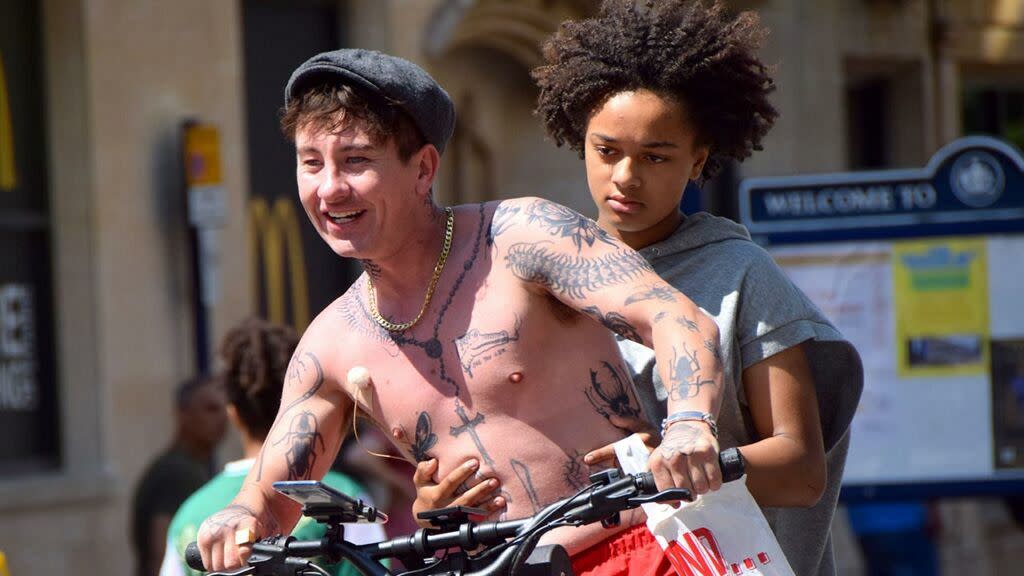Cannes 2024 review: 'Bird' - Andrea Arnold's superb fantastical tale set in broken Britain

Celebrated British director Andrea Arnold is no stranger to Cannes.
Three of her five feature films have won the Jury Prize award (Red Road, Fish Tank and American Honey) and this year, she’s already taking home the Carrosse d’Or, which recognises the career of innovative filmmakers.
And there’s a strong case to be made for her making it a double win – maybe finally the top gong?
For her new film Bird, she teams up with the ubiquitous double act Barry Keoghan and Franz Rogowski, and newcomer Nykiya Adams, who plays 12-year-old Bailey. We meet her sharing a moment with a seagull. A brief window of tranquillity in an otherwise troubled life.
She lives in a squat in North Kent with her livewire / overgrown child of a father Bug (a heavily tattooed Barry Keoghan) and her half-brother Hunter (Jason Buda).
After a three-month relationship, Bug announces quite flippantly that he’s going to get married to Kayleigh (Frankie Box), who will be moving in - much to Bailey's chagrin. Bug doesn’t have the money for it, but no bother - his new get-rich-quick venture will save the day. This includes finding the right kind of music to play to an imported “drug toad” so that it will produce hallucinogenic slime he can sell. Quite the entrepreneur.
Amusingly, Keoghan’s character dismisses ‘Murder on the Dance Floor’ as an appropriate choice, a cheeky wink for anyone in the audience aching for a Saltburn callback.
Bailey is something of an outsider, not only to her dad but to her whole chaotic community. As much as she tries to fit in with the local gang, who dish out violent justice to people who inflict pain upon their families or friends, she’d much rather spend her time documenting her surroundings on her phone: a seagull, crows, altercations between people (something which provides a safe distance from the reality of violence), and a horse in a field.
It's in that same field where she meets Bird (Franz Rogowski). Prior to their encounter, she angrily shouts “Come on!” to the heavens, as if conjuring him into existence. He’s a wayward free spirt, a sort of thrift shop Mary Poppins, who approaches an initially wary Bailey.
“It’s beautiful,” he comments.
“What?” replies Bailey.
“The day.”
Bird is everything Bug and all of the men in her life aren’t: kind. She can’t help but be curious about him, an otherworldly presence with a strange name who frequently perches on rooftops like Bruno Ganz in Wings of Desire, surveying the world around him. Her draw towards him is hardly surprising, as beyond the empathy he shows her, Bailey is surrounded by animals – the butterflies in her room, her pop’s inked insects (from scarabs, a massive dragonfly on his back, to a huge millipede crawling onto his neck and face), and birds she seems to share a connection with. They, like some of the graffiti that populates the walls of her existence (“Wake up, beautiful”; “Don’t worry”), seem to suggest that there is more to life waiting to burst out and lift her up, even if the message is a hard one to immediately recognize, accept, or not dismiss as merely a coping mechanism.
Bailey and Bird sparked friendship centres around helping him to find his family, as we learn that he was originally from a nearby council block but went missing many moons ago, and has lost track of his parents.
From the description above, this can all sound a little coming-of-age twee, but nothing could be further from that reductive label. Arnold strikes a delicate balance by fusing social and magical realism, and never overplays her hand and the fairytale leanings Bird embraces; there’s a palpable melancholy and darkness throughout, and while Fish Tank is a familiar touchstone here, it’s a very different film compared to her previous works.
Some may be thrown by this, expecting to remain grounded through Arnold’s depiction of marginalized existences in broken-Britain. However, the writer-director finds a unique space where feelgood and broken dreams can coexist in an emotionally generous way.
Arnold also proves once again that she has an unparalleled talent not only for offering an empathetic and non-judgemental viewpoint of deeply flawed and emotionally volatile characters, but also for directing unknown young performers. Like with Katie Jarvis (Fish Tank) or Sasha Lane (American Honey), Arnold gives centre stage to Nykiya Adams, who carries the show, and manages to hold her own faced with her more seasoned cast mates. Her performance in particular manages to speak volumes without necessarily vocalizing pain, juggling both strength and vulnerability without having one overshadow the other.
And then there’s that soundtrack, the best of the festival so far, with brilliantly employed needle drops from Fontaines D.C., Blur, The Verve, Gemma Dunleavy and even Rednex. Each track perfectly complements the mood of every scene. And any film that can drop Coldplay’s 'Yellow' and make it give you shivers you never expected is worth treasuring.
Nothing shall be spoiled as to where Bird goes, even if some developments are predictable, as enough fantastical hints are dropped throughout so that the big swing reveal doesn’t feel so surprising. However, it doesn’t have to be; it reveals the arresting and at times incredibly poignant film to be about finding hope in everyday turmoil, and how letting empowering metamorphosis (in all its forms) change you for the better is always worth it.
“Don’t you worry - everything will be ok,” Bird tells Bailey in their final moments together.
Thanks to Andrea Arnold, you’ll leave this film ready to believe his uplifting words, and prepped to take flight.
Bird premieres in Competition at this year's Cannes Film Festival.


